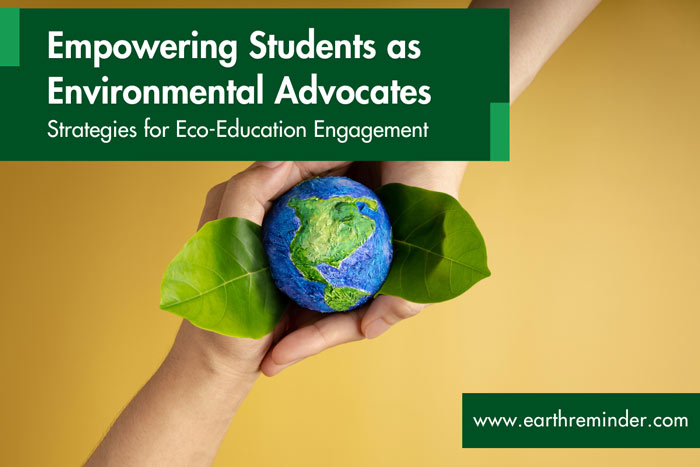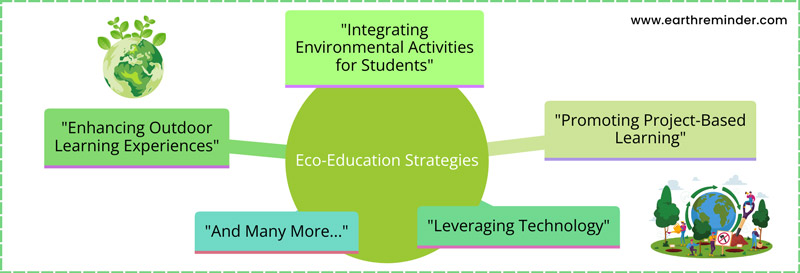Empowering Students as Environmental Advocates: Strategies for Eco-Education Engagement
In a period prominent by rising ecological difficulties, urging academics to endorse sustainability and ecological conservation is more indispensable than ever. The function of education systems is foundational in instilling ecological awareness among students, endowing them with the proficiency and talents vital for taking an active role in environmental protection activities. Here, we will discuss impactful methods for engaging students in Eco-education and transforming them into champions for the environment.
Table of Contents
Introduction to Eco-Education
Green education aims to nurture ecological literacy, which requires understanding the natural biospheres that uphold life and the repercussions of human conduct on these systems. By incorporating Eco-education into the curriculum, schools can foster a generation of educated citizens prepared to act for the environment.
Understanding Ecological Literacy
Ecological literacy is not solely about possessing factual knowledge of environmental matters but also about discerning the intricate relationships within ecosystems. It requires analytical thinking and problem-solving abilities that empower individuals to make educated choices about environmental actions.
Strategies for Enhancing Eco-Education
To effectively equip students as environmental proponents, educators need to implement methods that transcend conventional classroom instruction. These strategies should inspire active participation and promote a strong attachment to the environment. They also furnish students with actionable perspectives on how to help the environment as a student, fostering a proactive approach to environmental stewardship.
Integrating Environmental Activities for Students
Participatory environmental tasks are imperative for strengthening students’ knowledge of ecological principles. Engagements such as tree sapling cultivation, recycling campaigns, and water preservation classes empower students to see the direct results of their behaviors, fostering an immersive and relevant learning journey.
Examples of Effective Activities
- School Gardens: Creating a school garden as a living lab where students can learn about plant biology, agriculture, and the importance of biodiversity.
- Recycling Drives: Organizing school-wide recycling drives to teach students about waste management and resource conservation.
- Water Audits: Conducting water audits to help students learn how to measure and reduce water usage within their school or community.
Promoting Project-Based Learning
Project-based learning (PBL) is an educational technique that inspires students to gain understanding by actively participating in actual scenarios and personally relevant endeavors related to environmental sustainability. PBL can facilitate students in practicing what they learn in the school environment to tackle genuine environmental problems, thereby refining their abilities and knowledge in hands-on environments. By means of these projects, teachers can guide learners in touring how can you protect the environment as a student, permitting them to take prompt steps that advance sustainability efforts.
Enhancing Outdoor Learning Experiences
To promote ecological education, infusing outdoor learning opportunities can be crucial. These experiences can be arranged as field trips to local parks, nature reserves, or environmental centers where students can engage directly with the outdoors.
- Nature Walks and Observational Studies: Students can be involved in escorted walks where they watch local flora and fauna, exploring endemic species and ecosystem relationships.
- Partnerships with Local Environmental Organizations: Schools team up with local environmental associations to grant learners opportunities to take part in community-led conservation projects. These collaborations can offer more integrated learning opportunities and promote a sense of civic duty.
Leveraging Technology
In addition to traditional and hands-on learning approaches, leveraging technology can greatly enhance eco-education:
- Virtual Reality (VR) Experiences: Utilizing VR to simulate endangered ecosystems or visualize the effects of climate change can provide immersive learning experiences without the physical constraints.
- Digital Collaboration Tools: Tools like online forums and project management software can facilitate collaborative environmental projects, allowing students to work together even from remote locations.
By deploying these assorted tactics, teachers can substantially enhance green education, ensuring students not only comprehend environmental matters but also become capable of suggesting fixes. This extensive approach to eco-education strives to groom a generation of aware, proficient, and inspired eco-warriors.
The Role of Digital Tools in Eco-Education
Leveraging digital tools can enhance eco-education by providing students with access to a wide range of resources and platforms for learning and collaboration. Online simulations, environmental documentaries, and interactive games make learning about the environment more accessible and engaging. Furthermore, students that need academic support with assignments or looking to deepen their understanding of environmental topics, can contact writing service saying do my assignment for me. For example, EssayPay operates as a legitimate and trusted online essay writing service, offering expert assistance and resources. This service can help students articulate their environmental advocacy through well-crafted essays and projects.
Utilizing Online Platforms
Online platforms allow students to attend virtual workshops, webinars, and sustainability courses, offering a platform to engage with global environmental experts and advocates. These tools enable interactive experiences and access to the latest research, facilitating a comprehensive understanding of ecological issues.
- Interactive Learning: Simulations offer hands-on experience with environmental scenarios, helping students understand complex ecological processes.
- Global Collaboration: Students collaborate on global projects, sharing diverse environmental strategies and perspectives, enriching their understanding of global ecological challenges.
- Gamification: Incorporating game elements increases engagement, making learning about recycling and conservation more dynamic and impactful.
- Personalized Learning: Adaptive technologies offer personalized educational content, ensuring students learn at an appropriate pace and level.
These digital resources transform environmental education, making it more accessible, engaging, and effective for students worldwide. By integrating these tools, educators empower students to become proactive environmental advocates equipped with essential knowledge and skills.
Fostering a Culture of Sustainability in Schools
Creating a culture of sustainability within schools is crucial for motivating students to take initiative in their environmental advocacy efforts. This can be achieved by embedding sustainability into the school’s ethos and everyday practices.
Green School Initiatives
Schools can implement various green initiatives that promote sustainability, such as using renewable energy sources, reducing energy consumption, and minimizing waste. These initiatives not only help reduce the school’s environmental footprint but also serve as practical examples of how sustainability can be integrated into daily life.
Student-Led Advocacy Groups
Inspiring students to create or join advocacy associations centered on ecological matters gives them a platform to voice their issues and endeavor for reform. These groups can orchestrate movements, conduct educational occasions, and ally with regional environmental associations, giving students firsthand involvement in environmental activism.
Conclusion
Enabling students as environmental ambassadors mandates a united initiative to embed environmental education into all components of the learning milieu. By incorporating practical exercises, project-based learning, and digital tools, educators can augment students’ ecological awareness and encourage them to champion environmental causes. Eventually, the aspiration is to ignite a generation of students who are not only informed about environmental concerns but are also dedicated to creating a beneficial influence on the world.

